Ilha de Mozambique
January 3rd, 2025
The last time we had to take a tender ashore it was rough and getting in and out of the tender was quite an ordeal due to it moving up and down.
No worries about that today, the sea was very calm.
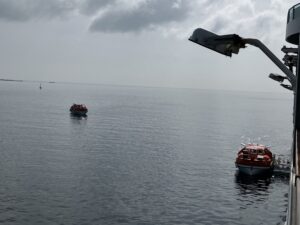
As soon as we and our friends were ready, we went to deck 3 to wait for a tender. There was no queueing up for tender tickets or waiting for the tender to be overfull before we set off, as soon as the 6 of us waiting for the tender were on board, off we set for the short, smooth ride to the pier. and to visit Stone Town
That was so easy, I am really beginning to reconsider large ship cruising.
Going ashore wasn’t as easy. There were steep steps at the pier, but there were crew members to hold on to if you needed assistance. I had no issues, however having seen several of the other guests on this ship, I was thinking that this would be a huge, and potentially unsafe challenge for them.
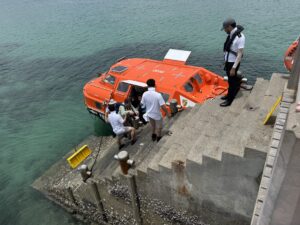
Captain Hamish and his wife were at the end of the pier checking to see how we had thought about the disembarkation from the tender. I let him know it was fine, and that having the crew members there if needed was a great idea and I thanked him for that. Later I realized that I really wasn’t doing a service to the folks with mobility issues, but hopefully they will have let Captain Hamish know their concerns.
It was very hot and humid, and it was interesting to see our always very formally dressed captain in khaki shorts. It certainly made sense. I was regretting wearing long pants instead of a sun dress which would have been much more comfortable for the weather, but as this is mostly a Muslim island I felt I long pants were more appropriate than a sundress.
There was the hull of a sunken ship next to the pier.
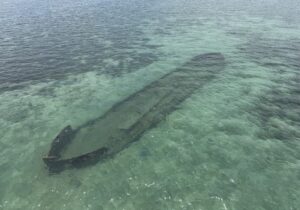
There is a beach right next to the pier.
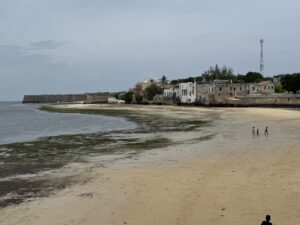
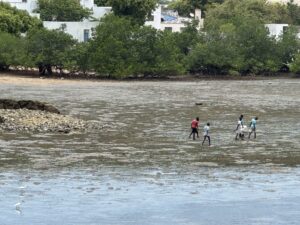
The tide was out, and the dhows looked like they were barley afloat.
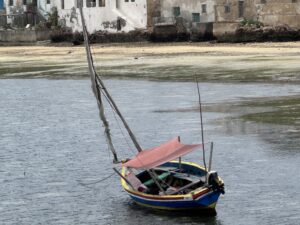
It was a really pretty scene.
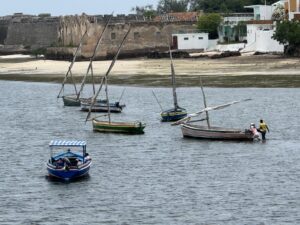
Towards the end of the pier were black and white tiles similar to those we had seen in Portugal and Brazil. A probable remnant of colonial days.
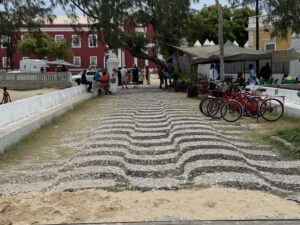
At the end of the pier we were greeted by drumming, dancing, and singing. It was a lovely welcome.
Although there are many things to see on the island, our goal today was to see the fort. We headed there past the old Palácio dos Capitães-Generais, which is now the museum and also houses the tourist information office that sells really good street maps and has all sorts of other information about the various restaurants and accommodation on the island. In front of it is a statue of Vasco da Gama.
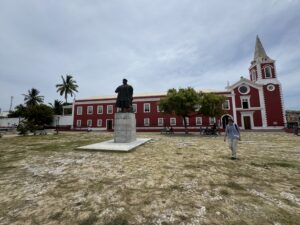
They have some interesting streetlights.
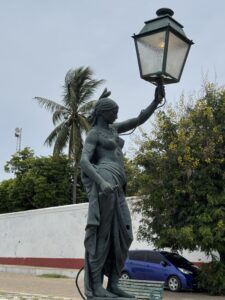
It was an easy walk to the fort
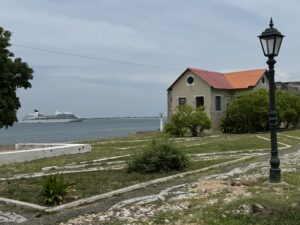
Many of the buildings look like they are abandoned, and about to fall down.
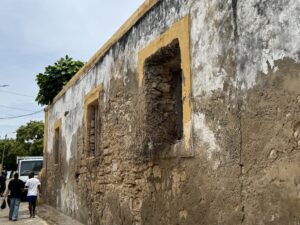
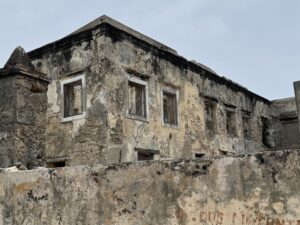
Others are in good shape.
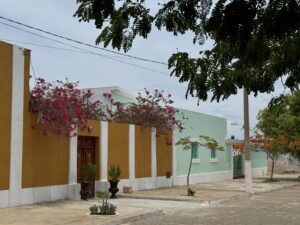
The high school also looked like it needed work.
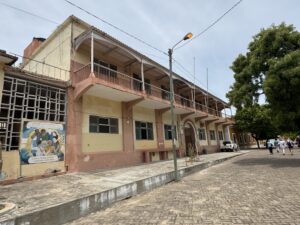
There were no shops as such, but there were several stalls along the way to the fort.
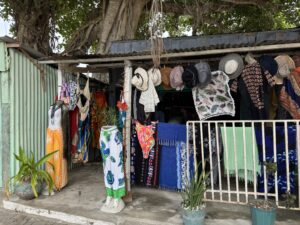
Finally we arrived at the fort. The Fort of São Sebastião lies at the northern end of Stone Town. It is the oldest complete fort still standing in sub-Saharan Africa. Construction by the Portuguese began in 1558, and it took about fifty years to complete. The fort was involved in the trading of slaves, spices and gold.
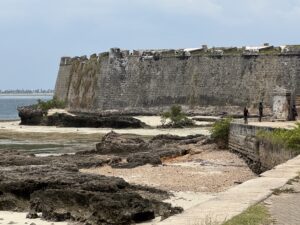
It looked like it was falling down, and possibly unsafe, but there was something almost magical about being there despite the decay. It may have had a chequered past, but in the present it felt strangely inviting. Maybe it was just because being inside the damp building gave us some respite from the stifling heat and swayed my way of thinking.
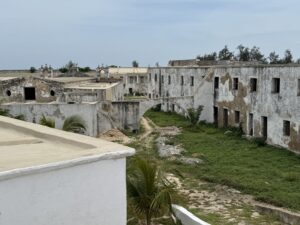
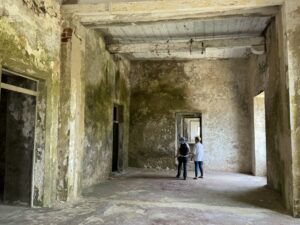
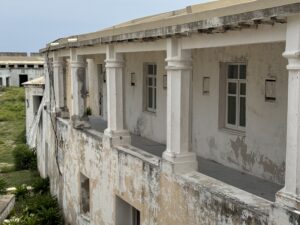
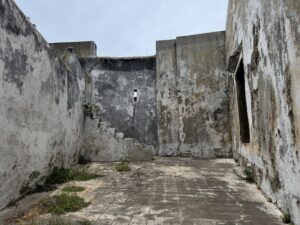
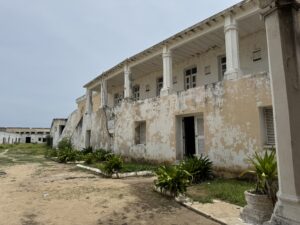
Anyway, it had some really cool cannons.
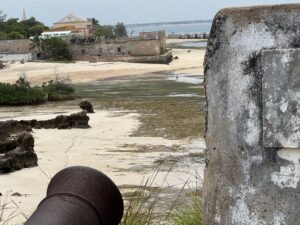
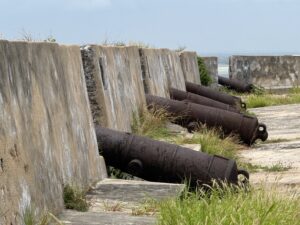
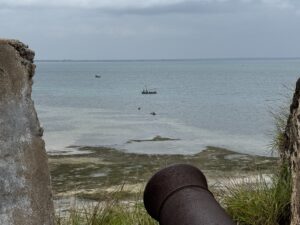
Nearby is the Chapel of Nossa Senhora de Baluarte.
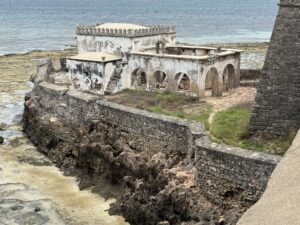
Built in 1522 it is considered to be the oldest European building in the southern hemisphere. According to the guide I read it is also one of the best examples of Manueline vaulted architecture in Mozambique. Of course then I had to find out what on earth Manueline vaulted architecture was.
Apparently Manueline architecture marks the transition from Late Gothic to Renaissance architecture. It incorporates maritime elements and representations of the discoveries brought from the voyages of Vasco da Gama. Another good example of it is the Belem Tower in Lisbon.
Be that as it may, although it has recently been renovated, it still looks like it is in ruins.
There was a lot more to do on the island, but our urge to educate ourselves and embark on more sightseeing waned, and instead we decided to get out of the heat and humidity and have lunch.
We went to Ancora d’Ouro which was a real find. The food was great, and I loved the blue table cloths.
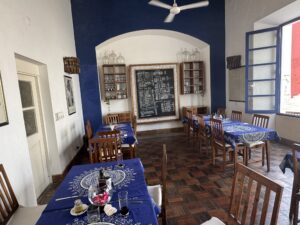
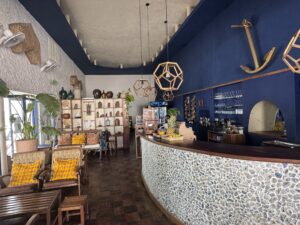
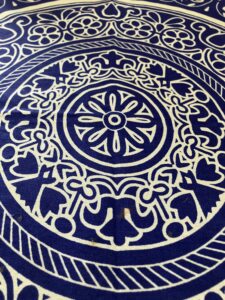
We continued in our search for peri peri prawns, and the prawns were really good. Still not as good as the ones in Johnny’s in Beira, but certainly extremely tasty.
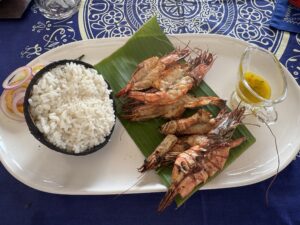
They also had interesting light fixtures. One way to recycle beer bottles.
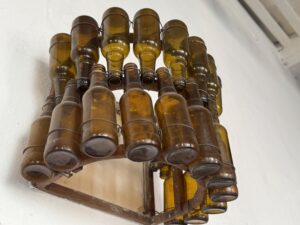
Across the street from the restaurant is the Igreja da Misericordia. It was built in 1556 but destroyed by the Dutch during their siege of the island in 1607. It was rebuilt in the 17th century.
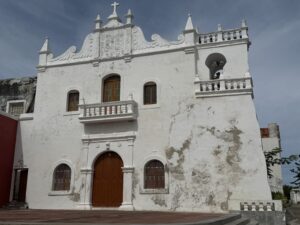
After we left the restaurant, we made our way back to the pier and braved the stairs to take a tender back to the ship.
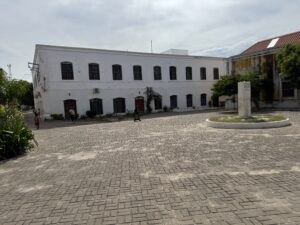
Back on board the sail away was about to begin. We did not get to have our caviar on the beach, but I did get to have my prawns, and now we had caviar and bubbly and Nick singing by the pool, so I was quite satisfied.
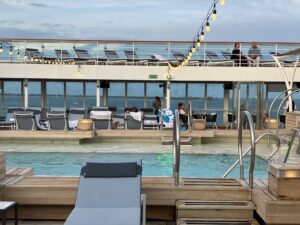
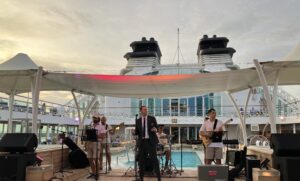
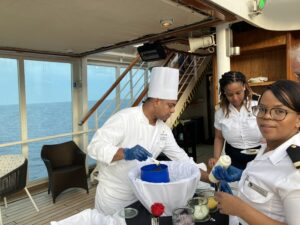
From the ship we looked back at the fort
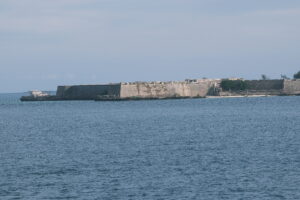
And you could see the mainland which is only 4 Km away.
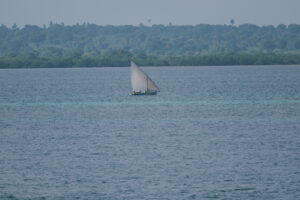
The island is connected to the mainland by a bridge.
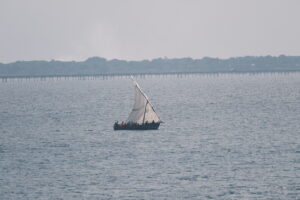
We sat by the pool until it was quite dark, and time to get ready for dinner.
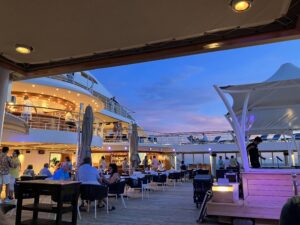
The guitar duo CH2 entertained us again tonight. Listening to them was a great way to end another perfect day. Next stop Zanzibar!


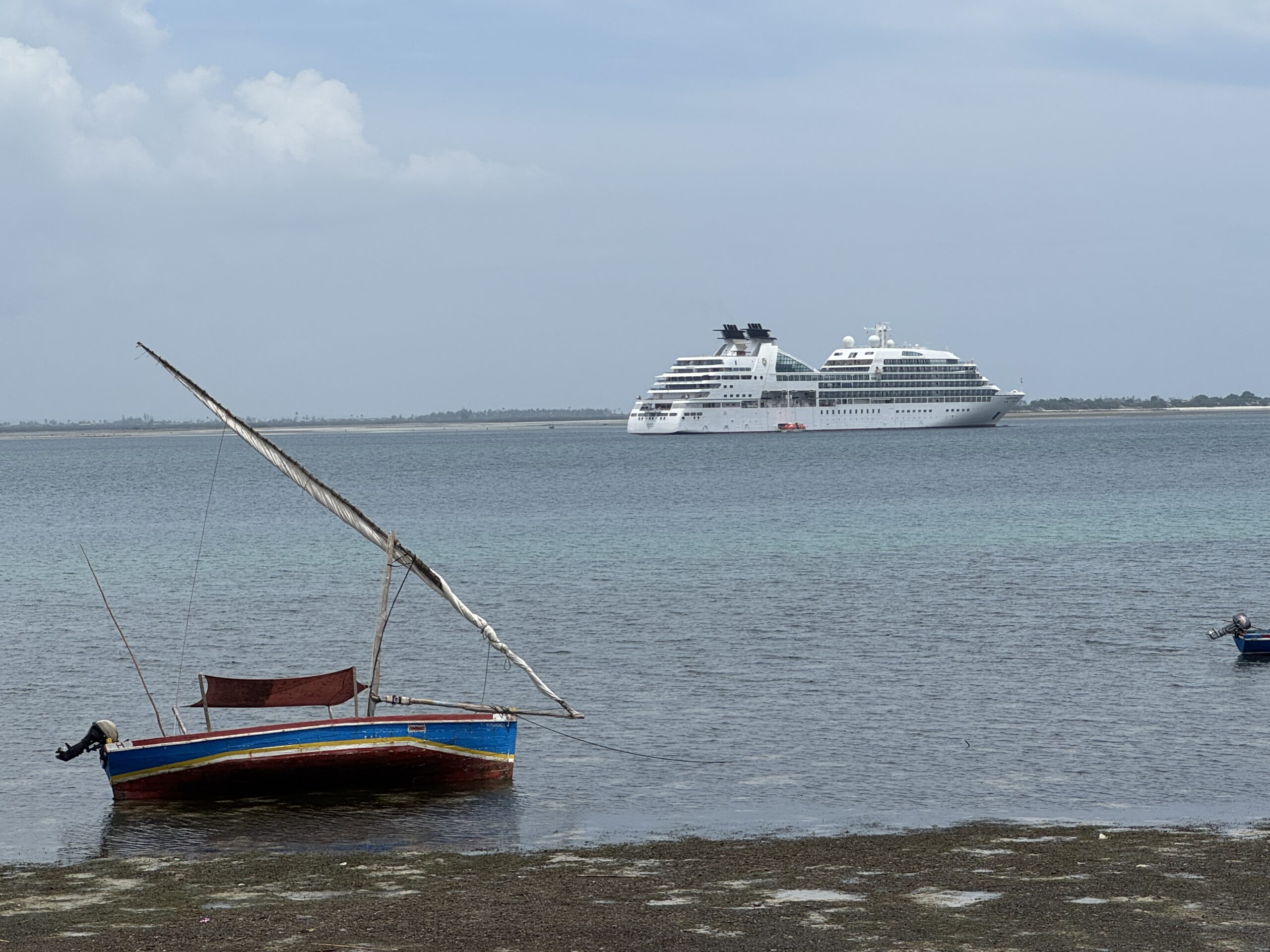
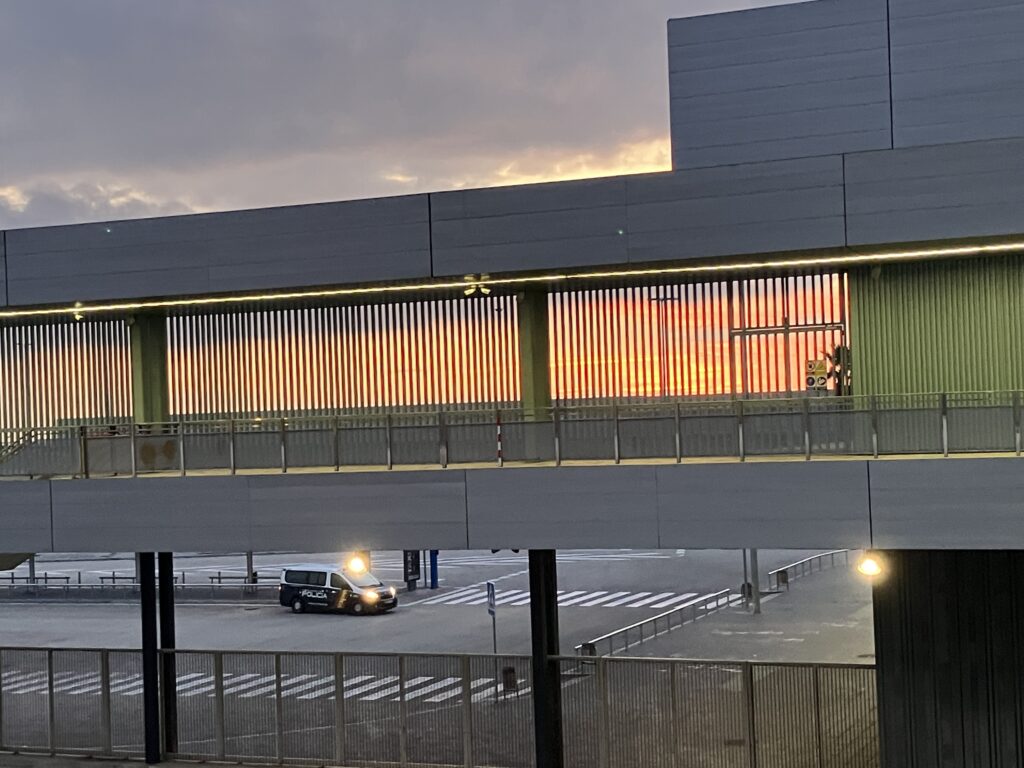

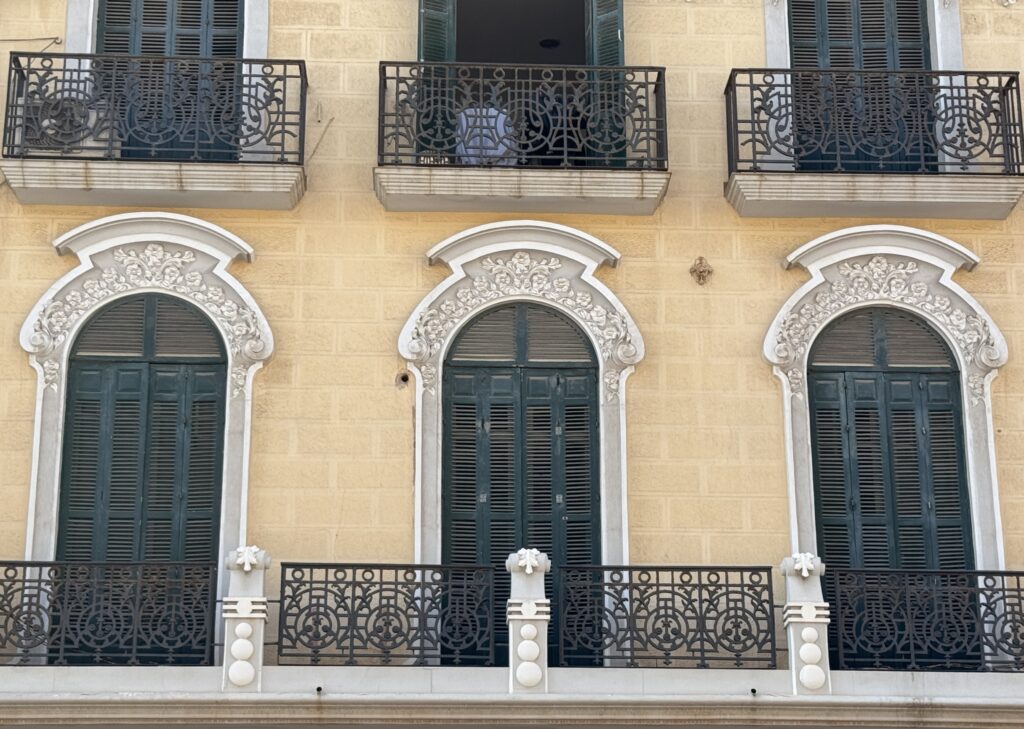
Boy, those steps would make me nervous. We’re you on the QE when they had an accident between the tender and the ship in Cambodia? I’ve been very cautious about tenders since then.
Luckily the sea was calm and we are still fairly agile, but on a rough day that just looked like an accident about to happen. Luckily there were crew members to help us, but it would still have been very easy to slip on the wet slimy concrete. Luckily there were no mishaps.